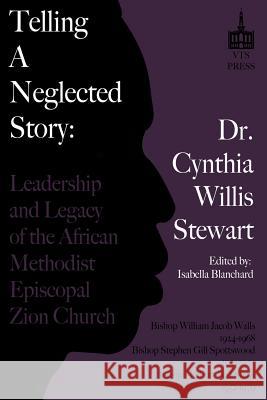Telling a Neglected Story: Leadership of the African Methodist Episcopal Zion Church in Difficult Times » książka
Telling a Neglected Story: Leadership of the African Methodist Episcopal Zion Church in Difficult Times
ISBN-13: 9780615841236 / Angielski / Miękka / 2014 / 196 str.
Telling a Neglected Story: Leadership of the African Methodist Episcopal Zion Church in Difficult Times
ISBN-13: 9780615841236 / Angielski / Miękka / 2014 / 196 str.
(netto: 61,15 VAT: 5%)
Najniższa cena z 30 dni: 63,68
ok. 16-18 dni roboczych.
Darmowa dostawa!
Telling a Neglected Story is a unique addition to African Methodist Episcopal Zion Church history. Drawing on primary and secondary sources, Dr. Cynthia Willis Stewart recounts the life stories and accomplishments of three remarkable A.M.E. Zion Church bishops: Bishop William Jacob Walls (1924-1968), Bishop Stephen Gill Spottswood (1952-1972), and Bishop Herbert Bell Shaw (1952-1979). Bishop William Jacob Walls is remembered for staging a three-hour sit-in in the segregated Washington Terminal Dining Room at Union Railroad Terminal in Washington, D.C., in 1925, some thirty years before Martin Luther King, Jr. began leading groups in passive resistance. In 1944, when the former residence of Harriet Tubman and the home for the aged she had founded were both scheduled for demolition, Bishop Walls led the effort to restore and protect the property, which today forms part of a National Historic Landmark. Bishop Walls's leadership was also critical in the creation of Camp Dorothy Walls, a summer camp and retreat center for the A.M.E. Zion Church in North Carolina's Blue Ridge Mountains. The Reverend Stephen Gill Spottswood's ordained ministry in A.M.E. Zion churches through the Northeastern United States culminated in his serving as pastor at John Wesley Church in Washington, D.C. His leadership in renovations and the expansion of ministries there led to that church being designated the National Church of Zion Methodism in 1940, and from that church he was elected bishop in 1952. As bishop he advocated unity between his denomination and the African Methodist Episcopal (A.M.E.) Church. While a merger of the two into a United African Methodist Church did not occur, he helped lay the groundwork for later joint efforts such as the 2009 Great Gathering of black Methodists. An active member of the National Association for the Advancement of Colored People (N.A.A.C.P.), Bishop Spottswood would rise to membership in the National Board of directors, and finally to being elected Chairman of the Board in 1961. He once led a twenty-two-car Freedom Train to Washington to highlight the need for more civil rights legislation. A naturally talented preacher, Herbert Bell Shaw began serving as an associate pastor, as a deacon, and then as an ordained elder at an early age. For five years he was Presiding Elder of the Wilmington District, then worked on the restructuring of the denomination's pension plan before being consecrated bishop in 1952. Bishop Shaw traveled the world on behalf of the A.M.E. Zion Church, serving as a delegate to World Methodist Conferences in Oxford, England, in North Carolina, and in Oslo, Norway. He was instrumental in organizing conferences in the Bahamas, Jamaica, and Trinidad and Tobago. At the time of his death, he was the senior bishop of the A.M.E. Zion Church, as well as the chairperson of the Board of Directors of the National Conference of Black Churchmen and vice president of the World Methodist Conference. Appendices in Telling a Neglected Story include the text of a letter from Dr. Martin Luther King Jr. to Bishop Walls; the keynote address delivered by Bishop Spottswood at the 1961 annual convention of the N.A.A.C.P.; and Bishop Herbert B. Shaw's 1970 Episcopal Address to the New York Annual Conference of the A.M.E. Zion Church. "This is a much-needed historical resource of the A.M.E. Zion Church. It provides valuable insights into the past that help us to learn and gain inspiration for the future."
-Dr. Mary A. Love, Editor, Department of Church School Literature, A.M.E. Zion Church











